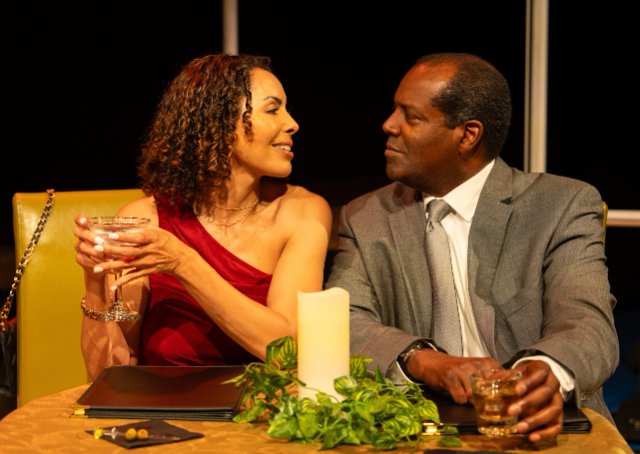King Liz
Breaking Down Barriers in City Lights' Smashing Production
By: Victor Cordell - Mar 25, 2024
“Back in the day” professional sports players were chattel. Three major trends changed the landscape. The U.S. Supreme Court rejected St. Louis Cardinals star Curt Flood’s challenge to Major League Baseball’s reserve clause but the pressure and momentum from the suit shifted more influence to the players. Secondly, players’ associations yielded collective bargaining power to athletes which far exceeded their individual influence. Finally, the employment of business agents gave players intermediaries with negotiating skills, analytical expertise, and legal knowledge.
In time, numerous agents would become famous and powerful, and their clients would share a huge chunk of the riches previously appropriated by the franchise owners. Although agents seem unlikely subjects for the performance world, the movie “Jerry Maguire” somewhat dispelled that notion, as Tom Cruise played an agent who improbably gained morality.
Against this backdrop comes the taut stage dramedy “King Liz,” which is given a rousing and highly entertaining rendering by City Lights. The play flows, driven by interesting characters and situations, with equal parts of humor, crassness, and dramatic situations.
Few industries have traditionally been as male-dominated and macho as professional sports. Along comes Liz Rico (note that rico in Spanish can mean rich, tasty, or sexy – all apply!), a Black-Hispanic who rose from the projects to graduate from Yale. She had taken a job as an assistant to a male sports agent in a startup business. Fast forward twenty-two years to the time of the play, and she is one of the most successful basketball agents in the business.
Damaris Divito is Liz, and in the highest reviewer compliment, she is totally convincing and captivating in the role. Divito captures Liz’s confidence and decisiveness and unswerving commitment to her profession, including her foregoing a family. Her charisma and ability to persuade, despite not being a people person, doesn’t hurt. But she can also be self-absorbed and callous to the point of meanness, as when she denies her assistant an extra ten minutes for lunch.
The owner of the agency, Mr. Candy, assigns a new prospect to Liz, Freddie Luna, who is rated the number one high school basketball player in the country. From the projects of Red Hook Brooklyn, he shares ethnic and socio-economic history with Liz. But he also comes with baggage. He had spent six months in juvenal detention for violent attacks. His sensitivity about the incident and his hair-trigger temper will continue to haunt him. Davied Morales is at the top of his game in this complex portrayal of a troubled but talented young man.
“King Liz” deals with a number of professional and social issues. The play’s title clearly marks the turf as a gender battle, and despite her success, Liz does have some sexist issues to deal with. But much of the conflict she faces is gender-free. It concerns loyalty and integrity. She acknowledges that “I lie, I cheat, I steal,” but is there a time at which she must consider values other than money and power? How does this caviar loving woman relate to a young man with basic instincts fresh from the hood?
The NBA is a graveyard for young men with athletic ability but without the maturity and commitment to meet its demands. The play even mentions the real-life tragedy of Len Bias, the number two overall pick in the 1986 draft, who died two days after being drafted from a cocaine overdose.
What should society expect from a youth like Freddie, who, just out of high school is thrown into the national spotlight and given a pile of money? What should or can the young man’s handlers do to ensure that he doesn’t undermine his “brand,” his health, and his emotional future? When a kid is used to hangin’ with his homies, how do you get him used to treating a professional schedule and his important adult obligations with thoughtfulness and seriousness?
Both Divito and Morales give bravura performances, dispensing sharp dialogue with great verve. They are supported by a talented supporting cast. Alycia Adame is Gabby, Liz’s highly competent assistant with a classic subordinate’s personality who wouldn’t be expected to rise in the ranks. Ray Renati is the ebullient but concerned Mr. Candy, who must decide who should run the agency upon his retirement. Fred Pitts is Coach Jones who didn’t want to draft Freddie and who has a conflicted relationship with Liz. Finally, Caitlin Papp is Barbara Flowers, a television journalist who has agreed to give Freddie a powder puff interview in hopes of helping his marketability for prospective endorsements.
The creative elements add to the effect – Ron Gasparinetti’s clean lined scenery, Carsten Koester’s sharp lighting, and George Psarras’s detailed soundtrack. However, for those who don’t like hip-hop, you’ll have to put your fingers in your ears every once in a while.
Overall, the production excels, and credit Director Kinan Valdez. One point for discussion however is that while the lead roles are well grounded in their archetypes, Mr. Candy, Gabby, and Coach are highly interpretive parts. They often seem silly in this rendering, which adds to the comic side of the piece. It is not clear whether these characterizations are specified by the playwright’s stage directions, but it would be interesting to see these parts played straight up to give the play more realism and dramatic heft.
“King Liz,” written by Fernanda Coppel, is produced by City Lights Theater Company, and plays on its stage at 529 South 2nd Street, San Jose, CA through April 21, 2024.






